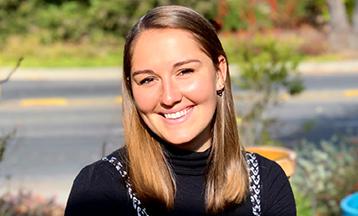-
bet亚洲365欢迎投注
Marist's Fall Open House
Experience all that Marist has to offer at our Fall Open House.
• 9月22日
• 10月13日
• 11月9日bet亚洲365欢迎投注
-
学者
-
入学 & 金融援助
Marist's Fall Open House
Experience all that Marist has to offer at our Fall Open House.
• 9月22日
• 10月13日
• 11月9日入学 & 金融援助
-
学生生活
-
bet亚洲365欢迎投注
- 住房
- 餐厅
- bet亚洲365欢迎投注
- 多样性、股票、 and 包容
- 校园地图
- bet亚洲365欢迎投注ID & bet亚洲365欢迎投注的钱
Marist's Fall Open House
Experience all that Marist has to offer at our Fall Open House.
• 9月22日
• 10月13日
• 11月9日学生生活
-
- bet亚洲365欢迎投注
Image of Matthew explaining

马修十二月
爪,纽约学校的学术
科学校园
纽约马修十二月 ’21 was one of about 70 college and university students from across the nation selected to travel to Washington, DC recently as part of the 23rd Annual Posters on the Hill event. Sponsored by the Council on 本科 Education with support from the American Chemical Society and Institute of Electrical and Electronics Engineers-USA, Posters on the Hill showcases the work of undergraduate researchers to members of Congress, 国会工作人员, federal 政府官员, 学者, 和其他人. The students’ research projects go through a rigorous, highly competitive review process and represent the best from around the nation. By presenting their outstanding work, 十二月 and his fellow students called policymakers’ attention to a range of serious issues and made a strong case for continued federal investment in undergraduate research.
十二月, 从爪, 纽约, is a chemistry and environmental science double major and a member of Marist’s 荣誉项目. Only the second student in college history to present at Posters on the Hill, his research is based on work he began in high school as part of a program sponsored by the State University of 纽约 at Albany. It was through this program that 十二月 first met Associate Professor of Environmental 科学 Zofia Gagnon, who would go on to be his research supervisor at Marist and accompany him to Washington, DC. Gagnon’s mentorship of his research, along with the beautiful campus (he reports that he “fell in love with it”), convinced him that Marist was the place for him.

十二月’s multi-year study has focused on the presence of pharmaceutical runoff in the Hudson River and its effect on plant and animal life. 具体地说, 他暴露了小龙虾, arrow arum (an aquatic plant), and hydroponic tomatoes to water from the Hudson River containing pharmaceuticals in order to observe the effect. The pharmaceuticals tested over a period of 18 days were amphetamine, 氟西汀, 和三氯生, and the findings have been startling. 十二月 reports that his research showed “significant structural damage to both plant and animal tissue after two weeks. In crayfish, we observed liver tumor growth and fatty acid accumulation. These structures in crayfish are analogous to those of humans, so it’s very concerning.” 十二月的笔记 that this research is significant because, while the Clean Water Act produced many improvements in the Hudson River, “aging sewage treatment infrastructure and the rapidly increasing use of pharmaceutical and personal care products (PPCP) are creating new problems.”
The chance to share his research findings on Capitol Hill with lawmakers, 政府官员, and other policymakers was a one-in-a-lifetime opportunity for 十二月, who presented his research in a private meeting with US Representative Antonio Delgado. “It felt great to share what we’ve discovered in the Hudson River directly with a member of Congress, who is in a position to act on that information and help our local environment.”
When 十二月 is not playing alto saxophone in the Marist Band, he is thinking about his future. He recently received a Tibor T. Polgar Fellowship from the Hudson River Foundation, so he’ll spend this summer continuing his research on the Hudson River. 展望未来, 十二月的笔记, “I want to get my PhD in environmental chemistry and eventually work in academia.” As someone with both a passion for research and firsthand knowledge of the positive impact of importance of faculty mentorship, his future students are sure to benefit.



